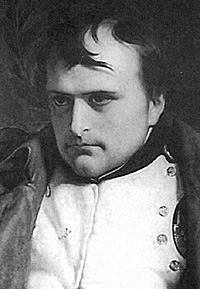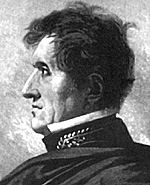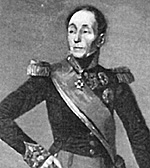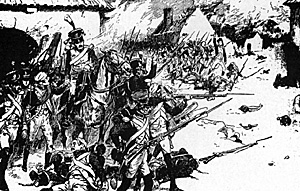An Unfortunate Trio:
Napoleon's Command Team of 1815
Part 1
by Patrick E. Wilson, UK
| |
It is the intention of the following essay to argue that not only were these men not to blame for the disastrous outcome of the campaign. But, given the circumstances, each of them performed to the best of their abilities and that the one man who was truly responsible for the whole sorry episode was none other then Napoleon himself. It was he who chose these men in the first place having known them for many years, unfortunately he needed a scapegoat or two for his failure and these men fitted the bill. Napoleon then used his time on St. Helena to place the main emphasis for his defeat on the shoulders of others. Historians and his admirers have subsequently seized upon these St. Helena statements and have helped to propagate the legend that Napoleon was a giant brought down by pygmies. Consequently the reputations of these fine generals have suffered, somewhat unfairly in my opinion. Marechal Jean de Dieu Soult
Amongst these had been Marechal Louis Alexandre Berthier, Napoleon's former Chief-of-Staff, Soult was a logical replacement, he understood Napoleon's method of war, had understudied Berthier during the Spring campaign of 1813, had a wealth of experience as Joseph's Chief-of-Staff in Spain during the conquest of Andalusia in 1809-10 and he was a sound administrator and organiser, as his Governorship of Berlin in 1808 and stewardship of Andalusia in 1810-12 clearly demonstrated. Soult would even have Berthier's right hand man, General Bailly de Montholon, as his assistant in the forthcoming campaign. And yet, many historians have subsequently argued that Soult was appointed to position that he had little prior experience or aptitude and as a result many of the communication errors of the campaign can be laid at his dour. Surely this is ill considered, The great Historian Houssaye himself admitted that only 'brilliant' staff work could have resulted in the concentration of the Armée du Nord prior to the opening of hostilities. [1]
Clearly some of the credit for this work must go to Soult. Even Napoleon on St. Helena admitted to Dr. O'Meara that he considered Soult 'an excellent major-general'. [2]
And let us not forget the campaign lasted only a mere 4 days and consequently Soult was hardly able to make his only mark as Chief-of-Staff, that there were some communication problems there is no doubt but even Berthier himself was not averse to the occasional mishap.
The must famous communication error of the campaign, the d'Erlon fiasco, occurred because a certain Colonel Forbin-Jansun failed to deliver an order from Napoleon to Ney, an order that would have clarified everything to Ney and prevented the whole sorry fiasco from ever occurring. Forbin-Janson was directed to take this order via d'Erlon so that that general could re-direct his march according, unfortunately having informed d'Erlon of the change of plan he forgot to proceed on to Ney and inform him too.
Forbin-Janson came straight from Napoleon. Soult was not responsible for this order or the dispatch of Forbin-Janson, apparently if had been up to him Forbin-Janson would have been dismissed from his position, as he had no experience whatsoever of staff work. Soult did however dispatch a duplicate of the order by another messenger as a precaution but by then the damage had already been dune. Even the dispatch of Soult's trusted aide Major Baudus could not avert or reduce the damage caused by Forbin-Janson's forgetfulness, though it is clear that Soult was not to blame and had even tried to undo some of the damage done.
On the 17th June Soult advised against the detachment of Grouchy with such a large force in pursuit of the Prussians, arguing that a smaller force was more than adequate for the purpose intended as Napoleon would need all the troops he could muster against the English. Napoleon chose to disregard this advise. It is perhaps worth noting that Soult had not only much experience in fighting against the English but had also campaigned in Belgium during the French Revolutionary Wars and had actually fought on the field of Waterloo against the Austrians in 1794. If Napoleon had taken Soult's advice on the morning of 18th June, when he advised the recall of Grouchy's detachment or part of it when the Prussians were observed near St. Lambert, then the outcome of the day may have been quite different. Finally it was Soult who brought Napoleon away from the field of Waterloo at the end of that fateful day and it was Soult who performed valuable services to his country still, when he rallied the defeated Armée du Nord at Laon before handing over to Marechal Grouchy on 26th June 1815.
Marechal Marquis Emmanuel de Grouchy
Appointed on 3rd June 1815 as Commander of the Cavalry Reserve of the Armée du Nord, Grouchy was instrumental in getting the cavalry regiments organised and equipped for in time for Napoleon's offensive but once that offensive began he suddenly found himself commander of the Army's right wing. It was a development that resulted in some friction with his immediate subordinates, Vandamme and Gerard, who with some justification felt that they should have had command. Grouchy however had the backing of Napoleon and Vandamme and the others had to follow the orders of the Marquis.
Grouchy's first encounter with the Prussians at Gilly was wrecked though when Vandamme refused to co-operate fully and the brigade of General Pirch II escaped the fate that would have befallen it if Vandamme had been more forthcoming. At Ligny though, Grouchy's contribution was magnificent, commanding mostly the cavalry of the right wing, he successfully pinned General Thielemann's entire Corps with a series of localised attacks that kept the Prussian left wing from making any significant contribution to the battle around Ligny and St. Amand.
That night, after the Prussians began their retreat, Grouchy went to ask for pursuit orders and was told that Napoleon was too tired to see him. First thing in the morning he returned again but was told that Napoleon was still asleep and no one dared wake him. Grouchy was thus kept waiting for hours for orders that should have been issued immediately after the Prussian defeat, the Prussians themselves had fully expected this and had acted accordingly. And yet, orders were not issued to Grouchy until the afternoon of 17th June, well over 12 hours after the battle had ended. This time was valuable and should not have lost. Grouchy himself had Kept asking for orders and had been told rather rudely by Napoleon that he would issue them when he deemed it necessary. Some have argued that Napoleon was waiting for a reply from Ney at Quatre-Bras before committing himself but surely he could have given Grouchy the orders he requested earlier then he did, especially his cavalry. Indeed, if it hadn't been for Grouchy himself sending out patrols, contact with the Prussians may have been lost altogether. If Grouchy had been given orders that morning he would have undoubtedly caught General Thielemann and his Corps at Gembloux and defeated him there and then, the outcome of the campaign would have been altered as a result, perhaps in France's favour.
By the time Grouchy received his orders it was already pouring down with rain and his troops had to use roads already churned up by the passage of thousands of Prussians. Consequently when Grouchy's main body reached Gembloux, Thielemann and his troops were long gone. An opportunity had been lost. The weather and the exhausted state of Grouchy's troops probably convinced him of the need to rest them there at Gembloux. At 9.00pm that night Grouchy received a report that the Prussians were concentrating at Wavre. Grouchy's orders were to follow the Prussians: '...you will pursue the enemy. Scout out his march and inform me of his movements to enable me to penetrate his intentions'. [4]
It seems that Grouchy considered Wavre as merely a convenient resting place for Blucher, who he presumed to be retiring on Brussels. Grouchy decided to follow next day and issued orders accordingly, it was as these orders were being carried out the following day that a cannonade was heard in the direction of Mont St. Jean. There then followed the famous scene between Grouchy and Gerard, when the latter urged the former to march to the sound of the guns. But the fact that Grouchy had clear orders and the manner in which Gerard argued his point of view dissuaded Grouchy from taking his subordinate's advice, whether Gerard could have arrived in time to alter the final outcome of Waterloo is another subject of some debate.
Later that day Grouchy would receive Napoleon's 10.00am order to: '...direct your (Grouchy's) movements on Wavre so as to come nearer to us, to establish operational and liaison contact with us, pushing in front of you the Prussian army corps who have taken this direction and who might have stopped at Wavre, where you must arrive as soon as possible.' [5]
A postscript added that it was thought that General von Bulow and his corps was in the vicinity of St. Lambert and if Grouchy came closer he would catch Bulow red-handed and be able to crush him. Grouchy responded immediately to this order by shifting the emphasis of his attack away from Wavre to his left flank and there he eventually made good progress. The cavalry general Pajol storming the bridge at Limale and ultimately turning Thielemann's flank. This brought victory to Grouchy. Whether Grouchy perceived that Napoleon could be in danger is uncertain but I believe that he thought he had neutralised a major part of the Prussian Army and that only a single Prussian corps had slipped through and Napoleon could easily have dealt with that.
At 10.30am on the 19th June Grouchy was enlightened when he heard of the disaster at Waterloo. He immediately summoned his senior subordinates, explaining his decisions of the day before and showing great humility he disarmed all hostility towards him. With the help of his subordinates he then carried out a model retreat back to France, that not only added further renown to French arms but also added further to Grouchy's already well established reputation as a fine soldier. The retreat saved the lives of 30,000 undefeated men from certain destruction and demonstrated Grouchy's skill in command of a large force of all arms in a difficult situation.
Sadly however, many, including Napoleon, blamed Grouchy for the defeat at Waterloo. This is unfair, as Grouchy had undoubtedly only followed orders and as Berthier had once wrote about Napoleon's method of command he: '...requires neither advise nor plans of campaign; no one knows his designs, and it is our duty to obey'. [7]
Grouchy had done just that. If he had not arrived at Waterloo, it was because he had not been ordered to. Grouchy had successfully carried out his orders, to pursue the Prussians and then to take Wavre, and later to more closer to the battlefield of Waterloo. For those who suggest that Grouchy should have followed Gerard's advise and marched directly to Waterloo, one must point to the reaction of Napoleon to those who disobeyed his orders. Marechal Ney in 1807 received a very severe reprimand for taking the initiative. Grouchy's character also prevented this, especially when his original orders had emphasised caution: '...keep your two infantry corps constantly together in two and half miles of ground with several retreat exits; post intermediary cavalry detachments to communicate with General Headquarters.' [8]
|
 One of the most debated subjects of the Napoleonic Wars is undoubtedly Napoleon's selection for the key command positions of the Armée du Nord in 1815. These men, Soult, Grouchy and Ney, a late replacement for an ill Mortier, because of the disastrous outcome of this famous campaign, have found themselves vilified and generally blamed for the majority of mistakes and missed opportunities of Napoleon's Last campaign.
One of the most debated subjects of the Napoleonic Wars is undoubtedly Napoleon's selection for the key command positions of the Armée du Nord in 1815. These men, Soult, Grouchy and Ney, a late replacement for an ill Mortier, because of the disastrous outcome of this famous campaign, have found themselves vilified and generally blamed for the majority of mistakes and missed opportunities of Napoleon's Last campaign.
 On the 9th May 1815 Marechal Jean de Dieu Soult excepted the position of 'Major-General' with the Armée du Nord. Soult was one of the most experienced and gifted generals available to Napoleon in 1815 and even though certain generals would not shake hands with him because of his behaviour that March, when as Louis XVIII's Minister of War, he had tried to get Napoleon arrested. But Napoleon needed him now. He was short of experienced Marechals as many had remained faithful to their oaths of loyalty to Louis XVIII, some had even accompanied that King into exile.
On the 9th May 1815 Marechal Jean de Dieu Soult excepted the position of 'Major-General' with the Armée du Nord. Soult was one of the most experienced and gifted generals available to Napoleon in 1815 and even though certain generals would not shake hands with him because of his behaviour that March, when as Louis XVIII's Minister of War, he had tried to get Napoleon arrested. But Napoleon needed him now. He was short of experienced Marechals as many had remained faithful to their oaths of loyalty to Louis XVIII, some had even accompanied that King into exile.
 On 15th April 1815 Marquis Emmanuel de Grouchy was appointed Marechal d'Empire, Napoleon's last and destined to be one of the most controversial of his choices. For his services in past campaigns, especially at Vauchamps the previous year, Grouchy undoubtedly deserved the appointment and as a replacement for Murat as Commander-in-Chief of the Cavalry Reserve, he was perhaps second to none. Bessieres, Nansoulty and Lasalle were all dead. Still there were those that were against the appointment, Marechal Louis Davoust for example who certainly voiced his reservations. But that said, Grouchy was an extremely able soldier, having acquired a wealth of experience in the command of infantry and especially cavalry formations. It is also apparent that those that served with him entertained a healthy respect for his talents. Colonel Lubin Griois, Grouchy's artillery commandeer in Russia, wrote of his commander in the following terms: 'Present everywhere, with a serene calm air, he inspired so much confidence, so much assurance in such mounted troops as still remained that the enemy, despite reiterated attempts, could neither overcome nor discourage him. [3]
On 15th April 1815 Marquis Emmanuel de Grouchy was appointed Marechal d'Empire, Napoleon's last and destined to be one of the most controversial of his choices. For his services in past campaigns, especially at Vauchamps the previous year, Grouchy undoubtedly deserved the appointment and as a replacement for Murat as Commander-in-Chief of the Cavalry Reserve, he was perhaps second to none. Bessieres, Nansoulty and Lasalle were all dead. Still there were those that were against the appointment, Marechal Louis Davoust for example who certainly voiced his reservations. But that said, Grouchy was an extremely able soldier, having acquired a wealth of experience in the command of infantry and especially cavalry formations. It is also apparent that those that served with him entertained a healthy respect for his talents. Colonel Lubin Griois, Grouchy's artillery commandeer in Russia, wrote of his commander in the following terms: 'Present everywhere, with a serene calm air, he inspired so much confidence, so much assurance in such mounted troops as still remained that the enemy, despite reiterated attempts, could neither overcome nor discourage him. [3]
 By this time, 4.00pm, Grouchy was already engaged against General Thielemann at Wavre and the order seemed to confirm Grouchy's earlier decision to march on Wavre, as well as Napoleon's remark to Grouchy on 17th June that he intended to fight a battle against the English. Grouchy may also have felt that he was then fighting against the main body of the Prussian Army because of the furiously of the fighting and the nature of the ground, which concealed much of the enemy's position. An hour later however Grouchy received second order, Napoleon's 1.15pm order, that again confirmed his movements: 'You were planning therefore to go to Corbais and Wavre. This movement is in accordance with His Majesty's dispositions which have been communicated to you. However, the Emperor orders me to tell you that you must always manoeuvre in our direction and seek to come closer to us in order to join us before any corps can come between us.' [6]
By this time, 4.00pm, Grouchy was already engaged against General Thielemann at Wavre and the order seemed to confirm Grouchy's earlier decision to march on Wavre, as well as Napoleon's remark to Grouchy on 17th June that he intended to fight a battle against the English. Grouchy may also have felt that he was then fighting against the main body of the Prussian Army because of the furiously of the fighting and the nature of the ground, which concealed much of the enemy's position. An hour later however Grouchy received second order, Napoleon's 1.15pm order, that again confirmed his movements: 'You were planning therefore to go to Corbais and Wavre. This movement is in accordance with His Majesty's dispositions which have been communicated to you. However, the Emperor orders me to tell you that you must always manoeuvre in our direction and seek to come closer to us in order to join us before any corps can come between us.' [6]